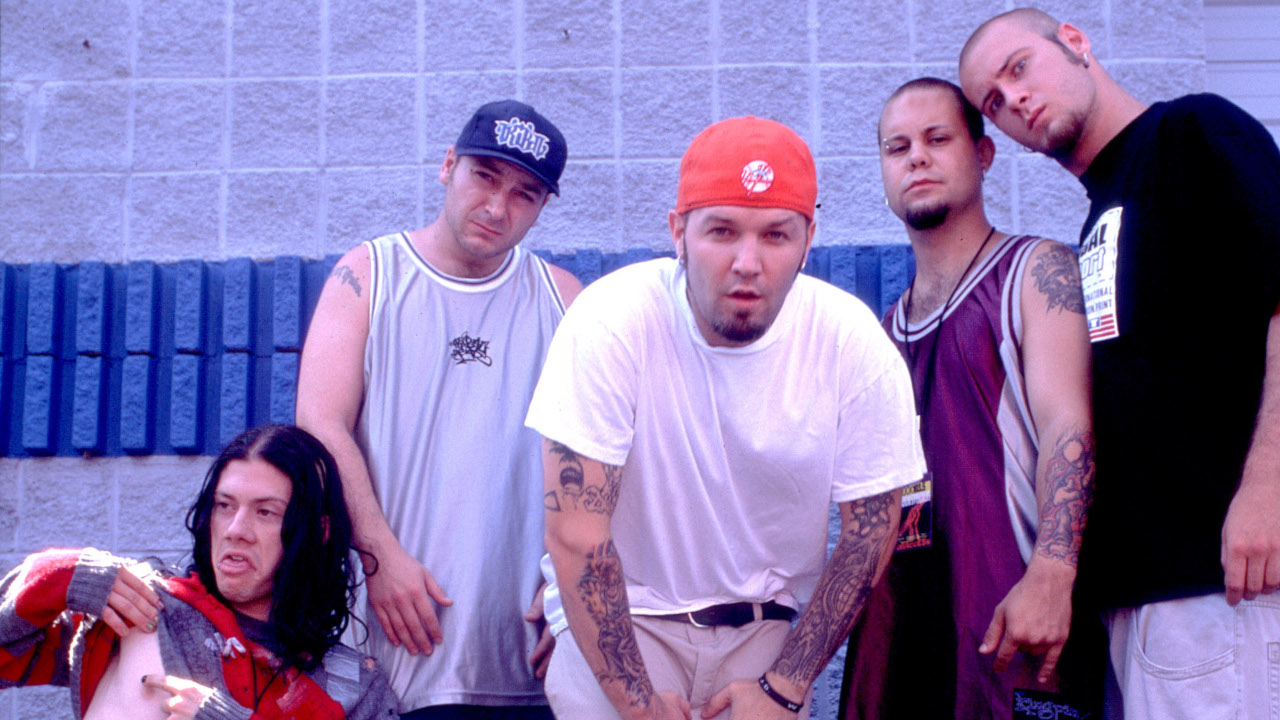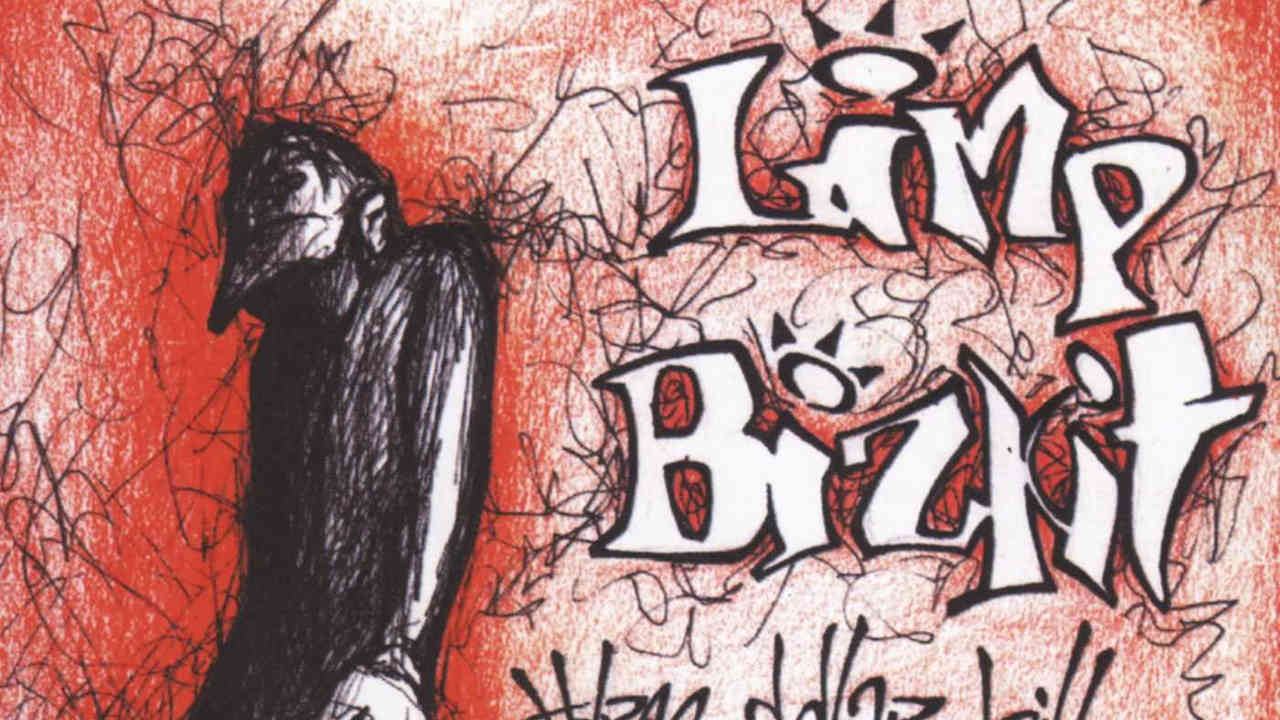It was October 23, 1997 in Burlington, Vermont, and Limp Bizkit were halfway through a show that was going down like a lead balloon. Four months earlier, their debut album, Three Dollar Bill, Y’all, which threw together blistering rap and juggernaut riffs, had marked them as one of metal’s promising new noises.
They had spent the last year on the road, playing their first UK shows – with Korn, including a stop at London’s iconic Brixton Academy in June – and Warped Tour in July and August. But that buzz hadn’t reached Burlington’s Memorial Auditorium yet – the reception that greeted Bizkit, who were supporting Primus alongside Powerman 5000, was one of stony apathy. What a difference a week can make.
“I’ve never seen anything change so quickly and so dramatically,” recalls Powerman 5000 vocalist Spider One who, watching from the side of the stage each night, quite literally saw Bizkit’s momentum catch up with them. “People started showing up early, they knew the songs and they were singing along. I remember distinctly when they’d play Counterfeit, people at the front on the barricade knowing every word. By the end of the tour, they should have been headlining above Primus.”
It’s hard to imagine now, but before the backlash, before the album launches at the Playboy Mansion, and before the band became overexposed, obnoxious caricatures of themselves vilified by the music press, there was a time when Limp Bizkit represented an exciting new frontier in heavy music.
Three Dollar Bill, Y’all didn’t spawn globally dominating singles such as Nookie or Rollin’ – in truth, it was a patchy record still feeling its way through a formula its creators would arguably nail on their follow-up, 1999’s Significant Other. But on its release on July 1, 1997, the album introduced an unfiltered, gritty, albeit green, fresh take on the rap-rock fusion of bands such as Rage Against The Machine and Faith No More.
“If you listen to it now, it’s probably got three or four really good songs on it,” says journalist Dan Silver, who interviewed the band in 1997 for their first Metal Hammer feature. “The rest of it feels like a stepping stone to where they would go. Its importance is the doors that it opened, rather than the music that was on it.”
It would be a few years until nu metal coalesced into the commercial force that would dominate popular culture through the late 90s and early 00s. But while the dots still needed connecting, they were already present and correct. That year, Coal Chamber released their self-titled debut, Incubus put out S.C.I.E.N.C.E. and Deftones dropped Around The Fur.
Meanwhile, System Of A Down had just signed to Rick Rubin’s American Recordings label and Korn had established themselves as metal’s grand hopes. “It did feel quite exciting,” remembers Dan. “All these bands with similar influences, and that knew each other, were forming a bit of a movement. It felt like something that was our own, for the younger generation coming through.”
Despite being lumped together, the bands that would form the bedrock of nu metal were disparate in both sound and aesthetic. On Three Dollar Bill, Y’all’s release, Limp Bizkit were incessantly dismissed as Korn wannabes, but in truth, their sound was much grittier than the rest of their peers’, drawing heavily from hip hop, metal and hardcore – although it shared that same boundary-blurring mentality.
“Me and Jonathan [Davis, Korn frontman] are the same age, we grew up listening to the same shit, everything’s the same and it kinda rubbed off on our music a bit,” Fred told us in ’97. “The intense build-up vibe is there, ’cos we’re part of this skool, but we’re not playing the same fucking notes, the same patterns, sustaining the same tunes… when they hear me rap, how could they say that?”
“They were an organic blend,” says Dan Silver today. “Fred has that hip hop background and DJ Lethal [ex-House Of Pain] clearly has that hip hop background, but Wes [Borland] is a classical metal guitarist, while [drummer] John Otto can flip between the two quite easily.”
It was no coincidence that the birth of nu metal coincided with the launch of the first MP3 player, spawning a shuffle mentality between bands, who had begun pulling influence from all corners of the sonic spectrum, and fans alike. For Fred, who’d grown up on a mixture of 80s hip hop, glam metal and hardcore, it was all part of his starting vision.
“A lot of bands have tried to mix up stuff,” Fred Durst told MTV in 1997. “But no one’s done it like us yet. We made sure it was a rollercoaster ride on that record.”

When Limp Bizkit formed in 1994, they quickly built a solid following in their hometown of Jacksonville, Florida, playing rowdy shows at a local haunt called Milk Bar. Back then, Fred was a hustler, rallying A&R executives and jamming flyers and demo tapes into the hands of anyone he could get to pay attention.
“He was always business savvy,” remembers Warped Tour founder Kevin Lyman, who runs the podcast My Warped Life, and had booked the band to play on the 1997 jaunt. “That knucklehead thing gets perpetuated, and they fed that in some ways. But in the background, there was a lot of business going on in their minds.”
During Warped Tour, Kevin remembers that Fred would sign up every day to meet with the press. “He wasn’t afraid to work. It might be some kid from the Poughkeepsie school newspaper, and he would give them an interview like he was talking to Rolling Stone.”
It all paid off in 1996, when Fred handed Korn’s bassist, Fieldy, a copy of Bizkit’s demo at a Jacksonville gig. It was Fieldy who would hook the band up with Ross Robinson, who produced Three Dollar Bill, Y’all at Indigo Ranch recording studio in Malibu, in early 1997. The long sessions, which aimed to capture the energy of the live show, were mired in Fred’s romantic melodrama.
“He had a lot of heaviness in his mind dealing with girlfriends, and he was serious,” Ross recalls. “So, he was kind of difficult to function around ’cos he was so heavy, and then extremely the greatest dude ever… it was kind of a bi-polar thing happening.”
There are many things to celebrate about Three Dollar Bill, Y’all’s futuristic vision, but Fred’s lyrical prowess is not one of them. The rapper’s relationship drama would provide the lyrical inspiration for Sour and Stuck (‘Stuck on yourself, you whore’), and listening to those tracks now is an uncomfortable experience that blunts the album’s innovative approach.
“At the time, not many people in the scene would have really batted an eyelid at those lyrics, but obviously 25 years later they don’t look great,” says Dan Silver. “Lots of people beat Limp Bizkit with lots of sticks, but their misogyny wasn’t really anything that came up at the time.”
It’s true that Bizkit’s unsavoury lyrics did little to stem their rise. By October 1998, slots on high-profile tours such as Ozzfest and Korn’s Family Values tour had only raised their profile. But it was their cover of George Michael’s Faith that would break them on a truly global scale.
“I came in [to the studio] one day and the band were like, ‘What the hell are you talking about? We’re going to do Faith?’” Fred told MTV in 2000. “I was like, ‘Trust me, man. We’ll do the beginning kind of cheesy like he did, then we’ll just… blow it up.’”
The video for the single was put on almost constant rotation by MTV. At a time when their endorsement could change your career overnight, Bizkit found themselves catapulted into the mainstream consciousness alongside megawatt stars such as Britney Spears and Christina Aguilera.
“I don’t think anybody expects to become that famous,” says Spider One. “You start your silly little band and you’re lucky to get out of the garage. Fred was just a normal dude and I think that’s ultimately what connected the fastest for them.”
Although Korn are recognised as spearheading nu metal, Faith would turn out to be the genre’s first true global moment. As the band’s profile grew, egos ran wild and unchecked, only emphasising the personality gulf between Fred’s cartoonish persona and the introspective, freakishly theatrical Wes Borland.
“It was always such a strange pairing,” says Spider One. “I don’t want to speak for [Wes], but I think that’s why he planted that flag, like, ‘I’m going to be the weird guy in this band.’ I think it was probably very important to him to draw a line, at least in an aesthetic way.”
Limp Bizkit’s subsequent albums, 1999’s Significant Other, and 2000’s unstoppable Chocolate Starfish And The Hot Dog Flavored Water, which would sell an incredible one million copies in its first week, and would eclipse Three Dollar Bill, Y’all in terms of commercial power. But the band’s debut would still go double platinum in July 2001, and can be credited as a turning point that steered metal towards mainstream consciousness.
“They were actually groundbreaking,” says Kevin Lyman, who reckons the band’s contribution to metal is often unfairly discounted. “Some of that knuckleheaded-ness overshadowed what they were doing.”
“Would Linkin Park have been as big as they were if Limp Bizkit hadn’t pushed this music towards the mainstream?” asks Dan Silver. In the end, he believes Three Dollar Bill, Y’all was the stepping stone that connected metal to mass acceptance, probably for the last time. “The doors it opened and the barriers it broke down are its greatest legacy.”

